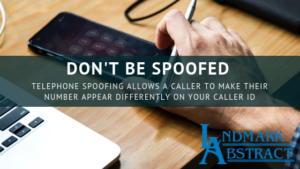Estimated reading time: 3 minutes
Dangers of Telephone Spoofing

The dangers of telephone spoofing are real! You’ve read the warnings: “Don’t wire funds in response to an email without using call-back procedures!” In other words, call the party who appears to have sent the email at a known, safe phone number and confirm that they actually sent the email. Well, what happens if you receive a phone call from your intended funds recipient, asking that you wire the funds? To be safe, you check your caller ID screen and match it to the known, safe number in your file. You even request an email confirming the instructions, and you receive it.
Are you good to wire? NO.
How the Scheme Works
Fraudsters and thieves are utilizing prepaid “burner” phones and applications that will “spoof” the caller ID of any phone number the caller chooses – even valid phone numbers of actual businesses.
This dangerous fraud scheme is rampant – our industry is not the only target. These telephone spoofing apps advertise themselves as a tool to “prank your friends,” but are actually being used by criminals posing as entities such as taxing authorities, local bank branches, and utility companies to defraud companies and consumers into sending money or providing confidential Non-public Personal Information (NPI).
How does telephone fraud scheme affect the title industry?
Next, how does this affect the title insurance and settlement services industry? Fraudsters have quickly learned that our responsible settlement professionals have begun utilizing call-back procedures to validate and verify emails regarding wiring of funds. They have begun calling with spoofed caller IDs in order to circumvent protective practices and procedures. Ultimately, telephone spoofing is a very real and growing concern throughout our industry.
How to Protect Yourself Against Fraud
DON’T GET SPOOFED! An incoming phone call never takes the place of an outgoing confirmatory call before wiring funds.
At the beginning of your settlement process, you create a log with the correct and verified telephone numbers of all the parties involved. Still make an outgoing confirmatory call to those verified numbers prior to wiring any funds, the log will ensure you have the correct phone number easily accessible for those confirmatory calls.
Conclusion
Lastly, to learn more about other cybersecurity and fraud issues that affect our industry be sure to visit the fraud section of our Document Library. To report a telephone fraud case, read up on the federal government’s information, and to report fraud, see the Office of the Attorney General of Pennsylvania’s fraud complaint form.
Call us if you have any question, as well, at 717-293-9760. We are here to help!
Learn More:


Leave a Reply
You must be logged in to post a comment.